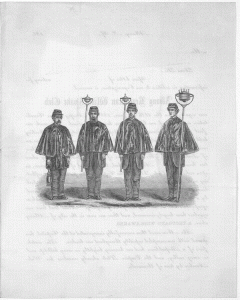
The Wide Awakes are one of the least known but most influential groups to have had a part of the election of 1860, and Libertyville is lucky enough to claim a part in their story.
The presidential election of 1860 was a very contested election. Four candidates held widely different stands on the hot button issues of the day: slavery, states’ rights, homesteading, and whether new states to the union should be slave or free. Abraham Lincoln was the candidate of the newly formed Republical party, and he was by no means the beloved name then that he is today. However, his supporters were passionate, and the most passionate of all his supporters made up a unique group called the Wide Awakes.
The Wide Awakes came into being as supporters of the Republican Party and first organized in March of 1860 in Hartford, Connecticut. The Honorable Cassius Clay, a state representative from Kentucky who was a Republican and an abolitionist, came to speak in Hartford in favor of the Republican candidate for governor of Connecticut. A torchlight procession was formed to escort Clay to and from the hall where he gave his speech. The young Republicans who escorted him carried leaky kerosene torches so they outfitted themselves in black cambric capes and caps. They made such an impression with the crowd and among themselves that they soon recruited more members for their marching club, made up a constitution, elected members, and gave themselves the name “Wide Awakes.”
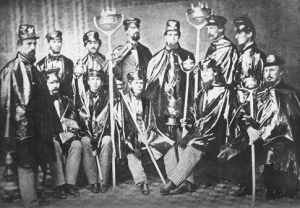
The Hartford group seemed to strike a chord with other enthusiastic young Republicans nearby. Wide Awake groups sprang up in neighboring towns in Connecticut, then in neighboring states. They took turns visiting each other’s towns for marching rallies when they weren’t providing escort duties to political candidates. As new groups formed they wrote to the Hartford club for advice on how to put together a Wide Awake club; the Hartford boys received so many requests that they printed up a form letter to send out instead of answering each request individually.
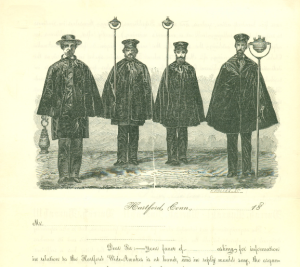
Wide Awake groups sprouted up across the country like dandilions, and as their popularity grew, so did their activities. They carried banners and lanterns in addition to their torches, they marched in formation, they sang, and their parades included bands and sometimes mounted riders. They carried no weapons but sometimes found themselves lured into a fight by belligerent members of the opposition. The Wide Awakes became so popular that newspapers in the south printed alarmist articles accusing them of being a military organization that would be ready to march into action against the south at a moments’ notice.
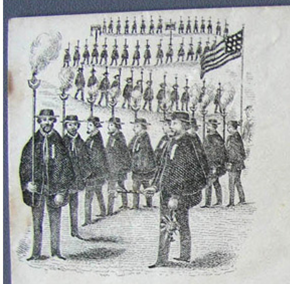
Wide Awakes put on quite a show at the Republican convention in Chicago in May of 1860 when Abraham Lincoln was nominated as the party’s presidential candidate over William Seward. The Chicago Wide Awakes marched every day; when the convention was over the delegates no doubt brought home tales of the impressive marching clubs they had seen, and more Wide Awake clubs were formed throughout the Midwest. It’s not hard to see the appeal; what self-respecting young Republican wouldn’t want to be part of a uniformed, disciplined, marching, torch-bearing group like the Wide Awakes?
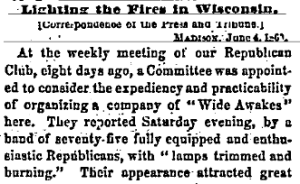
The popularity and enthusiasm of the Wide Awakes had reached a fever pitch in October before the November election.The Wide Awakes of New York City decided to have a National Wide Awake demonstration a month before the election, on October 3rd. At first just the Wide Awakes from Brooklyn and New Jersey were invited, but soon the event ballooned into an all-out lollapalooza. Wide Awakes came from every ward and borough of New York City; from Brunswick and Camden, New Jersey; from Boston, Providence, Albany; from Hartford and New Haven Connecticut, the last group being accompanied by a Glee Club of 20 members drawn in a decorated wagon. On the day following the demonstration, the entire front page of the New York Times was taken up with descriptions of the event. An estimated 12,000 Wide Awakes marched that night; the procession was five miles long and took two hours to pass by.
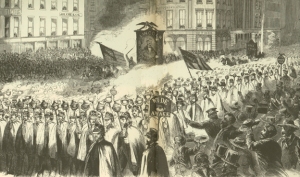
Meanwhile, out west, Chicago had plans of her own. Coincidentally, William Seward was scheduled to speak in Chicago on October 2, and that was reason enough for Wide Awakes from miles around to come for the event. In fact, to generate enthusiasm, the Chicago Wide Awakes offered a challenge: a beautiful silk banner would be given to the Wide Awake club who brought the greatest number of members in proportion to the number of Republican votes cast in their town in 1858. The Waukegan paper threw down the gauntlet for Lake County and asked, “Will Libertyville or Fremont or Wauconda or Waukegan bear off this prize? Let us all make the effort. It is not impossible that some town in Lake county may get it.”
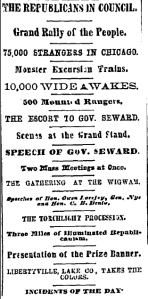
The big day arrived, and people poured into Chicago. The Chicago Tribune wrote, “Never was our city visited in a single day by as many strangers. It surpassed in numbers even the attendance upon the National Convention last spring, and the United States Fair of 1859. Every street…swarmed and buzzed like a bee hive.” Seward spoke in the afternoon and that evening the excitement continued. The Wide Awakes who had come to hear Seward gathered on South Michigan Avenue for the Torchlight Procession up Clark Street. At the end of the parade the winner of the coveted prize banner was announced…Libertyville. The banner was brought home by train and displayed at the Lake County Fair just days later to a very proud constituency.
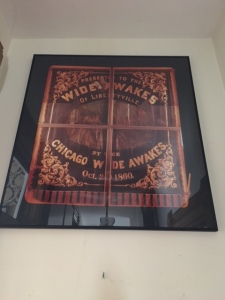
We know the rest of the story. Abraham Lincoln was elected president on November 3 and sworn into office on March 4, 1861. About a month later on April 12 shots were fired on Fort Sumter in Charleston, South Carolina and soon Lincoln was calling for volunteers for the army. The Civil War had begun. Were Wide Awakes across the country among those who volunteered and served during the Civil War? This is a question that remains unanswered. What we do know is that the Wide Awakes were a patriotic group of men who ardently supported Abraham Lincoln and the Republican Party. As the years passed, the men who had joined the Wide Awakes still cherished their memories of their torchlight parades and electioneering in 1860. Edwin Parkhurst, who was a member of the prize banner-winning Wide Awake club from Libertyville, spoke so often during his life of his participation in the big Chicago rally that it was mentioned in his obituary in 1927.
The prize banner won by those Libertyville Wide Awakes is still displayed with pride in the upstairs hallway of the Ansel B. Cook Home, along with two Wide Awake torches. The banner is 6 feet high and is showcased in a glass frame. It is made of black silk with writing of gold leaf and an illustration of the Chicago Wide Awake parade in the middle. Across the top it reads, “Presented to the Wide Awakes of Libertyville by the Chicago Wide Awakes, Oct. 2nd, 1860.” This banner is a cherished possession of the Libertyville-Mundelein Historical Society. The impact of the Wide Awakes may have faded over time, but they are still remembered in Libertyville.
Sources include:
– Grinspan, Jon, “Young Men for War: The Wide Awakes and Lincoln’s 1860 Presidential Campaign,” Journal of American History, 96 (September 2009), 357-78.
– Rathbun, Maj. Julius G., “The ‘Wide Awakes:’ The Great Political Organization of 1860,” The Connecticut Quarterly, vol. 1, 1895, p 327 – 335.
– Rinhart, Floyd, and Marion Rinhard, “The Prairies A-Blaze: Iowa Wide Awakes Carry Torches for Lincoln,” Iowa Heritage Illustrated, vol. 77, Spring, 1996, p. 42-48.
– Thompson, B. F., “The Wide Awakes of 1860,” The Magazine of American History, with notes and queries, November 1909, vol. 10, p. 293-296.
Categories: Local History
Tags: Local History
